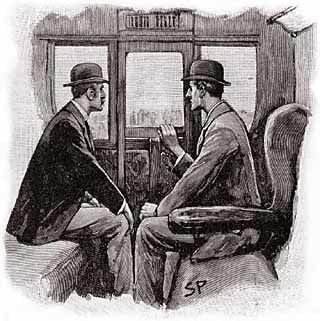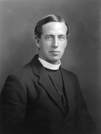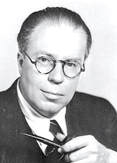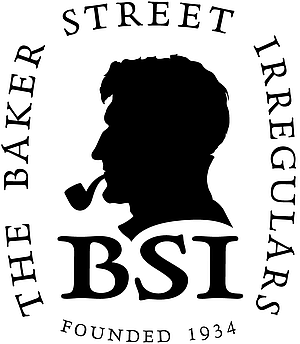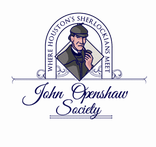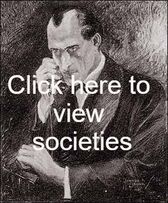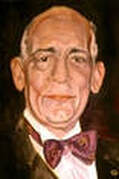First Time Visitors
|
“Look at those big, isolated clumps of buildings rising up above the slates, like brick islands in a lead-coloured sea.” “The board-schools.” “Light-houses, my boy! Beacons of the future! Capsules with hundreds of bright little seeds in each, out of which will spring the wiser, better England of the future -The Adventure of the Naval Treaty |
I don't know anything about the cult of Sherlock Holmes and I admit that I'm amazed that anyone would spend this amount of time and energy on a website for a fictional detective who was invented over a hundred years ago. And this isn't the only website -- there seem to be scores of them, with people writing articles and new stories about Holmes all the time.
What keeps otherwise normal people interested in Sherlock Holmes? What's the appeal?
It's all about the game
As a detective, Sherlock Holmes insists that logic, rationality, and deductive reasoning are his most important tools. "I never guess. It is a shocking habit – destructive to the logical faculty."[SIGN] You can learn a lot about Holmes by reading Sherlockian quotations.
And then let's consider that detective stories and novels, while exciting and entertaining, are not what most people consider to be "real literature." Crime novels have always been a little subversive—something you read on your own, strictly for pleasure. Forbidden in the classroom... and therefore fun.
What keeps otherwise normal people interested in Sherlock Holmes? What's the appeal?
It's all about the game
As a detective, Sherlock Holmes insists that logic, rationality, and deductive reasoning are his most important tools. "I never guess. It is a shocking habit – destructive to the logical faculty."[SIGN] You can learn a lot about Holmes by reading Sherlockian quotations.
And then let's consider that detective stories and novels, while exciting and entertaining, are not what most people consider to be "real literature." Crime novels have always been a little subversive—something you read on your own, strictly for pleasure. Forbidden in the classroom... and therefore fun.
|
In 1911 Ronald Knox, a British Catholic priest who not only translated the Bible but also wrote detective stories, gave a paper at Oxford called "Studies in the Literature of Sherlock Holmes" (published in his book, Essays in Satire, in 1928). Originally Knox wrote the essay as a satirical attack on the methodology of literary criticism. The mock-serious attitude of the essay set the tone for subsequent critical writings on Sherlock Holmes and mock-historical studies in which the actual existence of Holmes, Watson, et al. is assumed.
|
|
In 1934, Christopher Morley, an American author and essayist, started the Baker Street Irregulars ("BSI"), a group of Sherlock Holmes enthusiasts that became the parent group for many other Sherlockian scions. The membership quickly grew to include people with a wide range of professions and interests. Based on how important logic and reasoning were to Sherlock Holmes, Morley and his friends carried on the tradition of analyzing stories about the great detective using his own techniques to explain inconsistencies, gaps, characters and events. In 1946, the BSI started a magazine called the Baker Street Journal in which analytical Sherlockian articles are published. The Journal has published four issues a year since 1946 (except for a brief hiatus in 1950). Critical thinking has always been a hallmark of the Sherlockian world.
|
Jody Baker has written a nice treatise on the Sherlockian game, "In The Beginning was Ronald Knox." Another good article, "On Playing Sherlockia," appears on Carolyn and Joel Senter's website, Classic Specialties.
|
Today, the BSI includes more than 300 men and women from around the world, many of whom travel to New York City in January for the annual dinner. Members include writers, ambassadors, teachers, actors, doctors, lawyers, judges, business people, and many others. Not all Sherlockians are members of the BSI (though several members of the Beacon Society are). Usually people are "invested" as Irregulars after significant accomplishments in Sherlockian writings or in other areas. However, one does not have to be a BSI member to get together with other Sherlockians. There are hundreds of local Sherlock Holmes societies all over the world.
|
|
Most "scion societies" of the Baker Street Irregulars are fun-loving literary groups that focus on the writings of Arthur Conan Doyle—primarily his Sherlock Holmes stories. These groups typically meet every month or two, usually for dinner, and discuss a different Sherlock Holmes story. At most gatherings, a member presents a "scholarly paper" or some other type of presentation that raises issues or elucidates various facts that can be found in one or more stories. Members of Sherlockian societies include people from all walks of life: educators, students, authors, health care professionals, business people, legal professionals, government employees, retirees and others.
|
The Beacon Society is an unusual scion in having the specific goal of educating young people about Sherlock Holmes. Each Beacon member belongs to at least one or more typical scion society but Beacons are united in their commitment to introducing young people to the pleasure of reading and enjoying Sherlock Holmes.
Have a look around our website!
And if you haven't already, we encourage you to read some Sherlock Holmes stories. Where should you start? Arthur Conan Doyle had his favorite stories, and there have been several polls taken over the years by Sherlockians. You don't have to read the stories in the order they were written to enjoy them, but there are a few classics almost everyone recommends. Sherlockian.net has a great FAQ page about the world of Holmes and Watson that should get you started.
Have a look around our website!
And if you haven't already, we encourage you to read some Sherlock Holmes stories. Where should you start? Arthur Conan Doyle had his favorite stories, and there have been several polls taken over the years by Sherlockians. You don't have to read the stories in the order they were written to enjoy them, but there are a few classics almost everyone recommends. Sherlockian.net has a great FAQ page about the world of Holmes and Watson that should get you started.
|
Why read Sherlock Holmes today?
The Sherlock Holmes stories are excellent vehicles for stimulating classroom discussions of literature, language, history, science, technology and psychology. A Famous Character Sherlock Holmes has been called the most recognizable literary figure in the world. The Sherlockian tales of Sir Arthur Conan Doyle have been in constant publication since their first appearance over 100 years ago. The four novels and fifty-six stories are now on the Internet and audio recordings and selected film and television productions are available through libraries and shops. |
Vocabulary Building
The stories are well-written, interesting and exciting -- English vocabulary-building is painless when a mystery is involved. Dr John Watson, the sympathetic physician friend and associate of the cool and rational Holmes, is presented as the author of almost all the stories, although they were actually written by Sir Arthur Conan Doyle. The creator of Sherlock Holmes was an immensely popular author of historical fiction (he also wrote Brigadier Gerard and the Professor Challenger series).
Foreign Languages
Sherlock Holmes stories have been translated into over one hundred languages. A mystery story is a good way to engage students who are learning a new language. In addition to French, German, Italian, Spanish, Portuguese, Swedish, Finnish, Russian, Czechoslovakian, Latin, Hebrew, Chinese, Japanese, Arabic, Greek, Egyptian, Hindi, Sinhalese, Urdu and eighty more spoken languages, stories have also been published in non-spoken languages such as Braille, Pitman shorthand, Morse code, and others.
History
The stories are rich in historic detail about Victorian art, behavior, architecture, science, royalty, geography at a time (the Industrial Revolution) when great social, economic and technological progress was made in the United Kingdom. The Sherlock Holmes "Canon" began publication in 1887 during the later part of the reign of Queen Victoria, a time marked by a great expansion of the British Empire, the foremost global power of the time. If you're looking for a way to get students to study Victorian history or early scientific discoveries, try looking through the magnifying glass of Sherlock Holmes!
Detective Story
Holmes has been considered the model for the modern-day detective story. Not only is this a literary genre worthy of study, but the mysteries themselves are fascinating. The Sherlockian method of deductive reasoning foreshadows today's crime scene investigation units, but Holmes did it all without computers or sophisticated instruments. Holmes' deerstalker cap and magnifying glass are popular cultural symbols of Sherlock Holmes and almost everyone can give you a quote by the Great Detective (but not always an accurate one!)
Deductive Reasoning
Sherlock Holmes, the most logical of thinkers, teaches all we need to know about deductive reasoning. Observe and gather facts, analyze what you discover, formulate your theories and arrive at a solution. Holmes reminds us that "It is a capital mistake to theorize before one has data. Insensibly one begins to twist facts to suit theories, instead of theories to suit facts."[SCAN] And, "It is an old maxim of mine that when you have excluded the impossible, whatever remains, however improbable, must be the truth."[BERY]
Scholarly Research
Introducing students to scholarly research is surprisingly easy -- Holmes' ongoing popularity still generates contemporary research articles on various aspects of the stories and novels, many of which are available on the Internet and in libraries. Entire journals are devoted to Sherlock Holmes and papers appear regularly in publications in the fields of education, medicine, forensics, history and English.
Who are the Baker Street Irregulars (BSI)?
Who are the Adventuresses of Sherlock Holmes (ASH)?
What is a scion society?
What is "the Grand Game" played by Sherlockians?
What costume items are typical of Sherlock Holmes?
Who are Holmes' most well-known associates?
How many stories and novels about Sherlock Holmes are there?
The stories are well-written, interesting and exciting -- English vocabulary-building is painless when a mystery is involved. Dr John Watson, the sympathetic physician friend and associate of the cool and rational Holmes, is presented as the author of almost all the stories, although they were actually written by Sir Arthur Conan Doyle. The creator of Sherlock Holmes was an immensely popular author of historical fiction (he also wrote Brigadier Gerard and the Professor Challenger series).
Foreign Languages
Sherlock Holmes stories have been translated into over one hundred languages. A mystery story is a good way to engage students who are learning a new language. In addition to French, German, Italian, Spanish, Portuguese, Swedish, Finnish, Russian, Czechoslovakian, Latin, Hebrew, Chinese, Japanese, Arabic, Greek, Egyptian, Hindi, Sinhalese, Urdu and eighty more spoken languages, stories have also been published in non-spoken languages such as Braille, Pitman shorthand, Morse code, and others.
History
The stories are rich in historic detail about Victorian art, behavior, architecture, science, royalty, geography at a time (the Industrial Revolution) when great social, economic and technological progress was made in the United Kingdom. The Sherlock Holmes "Canon" began publication in 1887 during the later part of the reign of Queen Victoria, a time marked by a great expansion of the British Empire, the foremost global power of the time. If you're looking for a way to get students to study Victorian history or early scientific discoveries, try looking through the magnifying glass of Sherlock Holmes!
Detective Story
Holmes has been considered the model for the modern-day detective story. Not only is this a literary genre worthy of study, but the mysteries themselves are fascinating. The Sherlockian method of deductive reasoning foreshadows today's crime scene investigation units, but Holmes did it all without computers or sophisticated instruments. Holmes' deerstalker cap and magnifying glass are popular cultural symbols of Sherlock Holmes and almost everyone can give you a quote by the Great Detective (but not always an accurate one!)
Deductive Reasoning
Sherlock Holmes, the most logical of thinkers, teaches all we need to know about deductive reasoning. Observe and gather facts, analyze what you discover, formulate your theories and arrive at a solution. Holmes reminds us that "It is a capital mistake to theorize before one has data. Insensibly one begins to twist facts to suit theories, instead of theories to suit facts."[SCAN] And, "It is an old maxim of mine that when you have excluded the impossible, whatever remains, however improbable, must be the truth."[BERY]
Scholarly Research
Introducing students to scholarly research is surprisingly easy -- Holmes' ongoing popularity still generates contemporary research articles on various aspects of the stories and novels, many of which are available on the Internet and in libraries. Entire journals are devoted to Sherlock Holmes and papers appear regularly in publications in the fields of education, medicine, forensics, history and English.
Who are the Baker Street Irregulars (BSI)?
- Members of the first Sherlock Holmes Society (founded in 1934, the year before the British Sherlock Holmes Society).
- BSI members meet for dinner every January in New York City.
- Membership in the BSI is by invitation only.
- The BSI publishes the Baker Street Journal (BSJ), a quarterly publication.
Who are the Adventuresses of Sherlock Holmes (ASH)?
- Members of the first women’s Sherlock Holmes Society
- Membership in ASH is by invitation only
- Women weren’t invited into the BSI until 1991 and men weren’t invited into ASH until 2008
- ASH publishes The Serpentine Muse, a quarterly journal.
What is a scion society?
- A Sherlock Holmes group affiliated with the Baker Street Irregulars
- Anyone interested in Sherlock Holmes can start or join a scion society of the BSI
- There are BSI scion societies all over the world
- The Beacon Society is a scion society of the BSI
What is "the Grand Game" played by Sherlockians?
- Sherlock Holmes and Dr. John H. Watson were real
- Dr. Watson wrote the stories to record actual events
- Sir Arthur Conan Doyle was Watson’s literary agent
- Everything written in the Canon (all the stories about Sherlock Holmes, also called "the Sacred Writings") can be explained using Holmes’ methods of deductive research
What costume items are typical of Sherlock Holmes?
- Deerstalker hat
- Inverness cape
- Magnifying glass
- Pipe
- At home, Holmes wore a dressing-gown (silk robe worn over a shirt and trousers) and played the violin
Who are Holmes' most well-known associates?
- Dr. John H. Watson: Holmes’ biographer
- Mrs. Hudson: his landlady
- Irene Adler: The Woman
- Professor Moriarty: his nemesis
- Mycroft Holmes: his brother
- Inspector Lestrade: a Scotland Yard detective
- Wiggins: head of the band of street urchins Holmes called the Baker Street Irregulars
How many stories and novels about Sherlock Holmes are there?
- Sir Arthur Conan Doyle wrote 60 tales about Sherlock Holmes.
- Fifty-six stories of Sherlock Holmes are collected in five books (The Adventures of Sherlock Holmes, The Memoirs of Sherlock Holmes, The Return of Sherlock Holmes, His Last Bow, and The Case-Book of Sherlock Holmes.)
- There are four novels (A Study in Scarlet, The Sign of Four, The Hound of the Baskervilles, and The Valley of Fear).
- Most were originally published in the Strand Magazine, a popular monthly paperback.
- All were published between 1887 and 1927.
An Introduction to Sherlock Holmes Barbara Rusch
|
Richard Olken, Children Yet Unborn (How We Envy Them!)
Teaching Sir Arthur Conan Doyle A number of Sherlockians have taken it upon ourselves to develop methods and curricula that will enable educators to expand the circle of devotees of the Sherlock Holmes Canon and Doyle’s other writings. |

